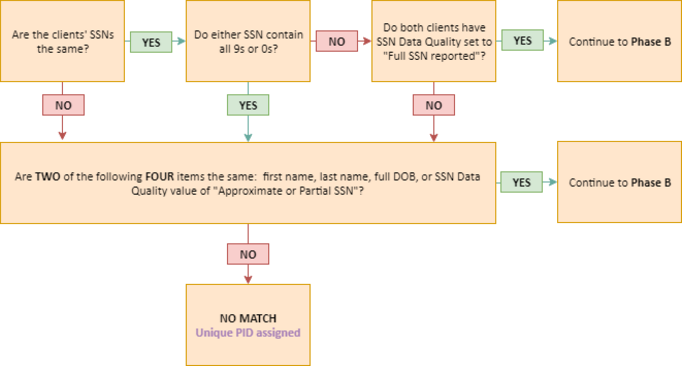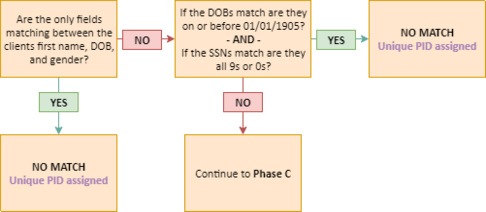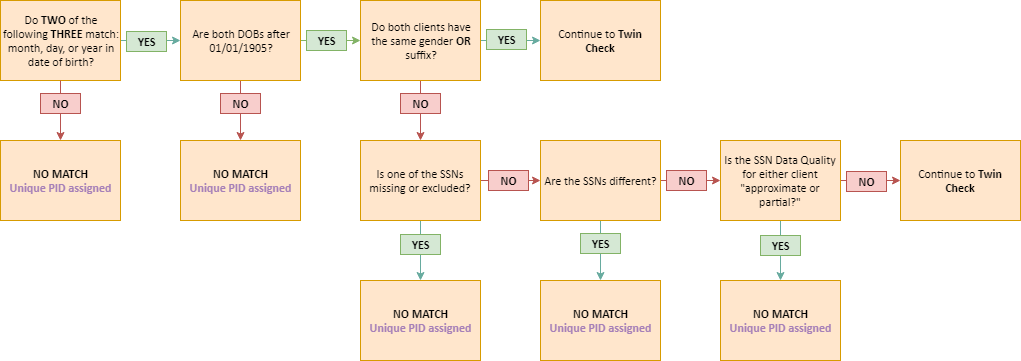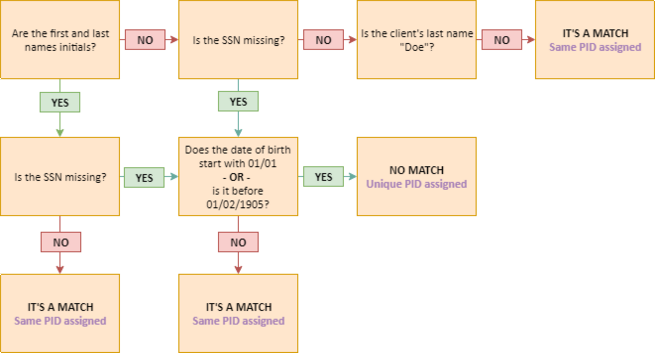|   |
The AWARDS Personal ID (PID) feature is used in multi-agency HMIS databases to identify and report on client records that are in different divisions (and thus have unique AWARDS IDs) but who are actually the same person (and thus should have the same PID).
When a record is added to the system, AWARDS uses the following criteria to determine whether the individual already exists in the database:
![]() First Name
First Name
![]() Last Name
Last Name
![]() Date of Birth *
Date of Birth *
![]() SSN *
SSN *
![]() NOTE: * May be excluded. If a client has a DOB prior to 1/1/1905 it is considered a generic/placeholder date used for clients of an unknown age. (Similarly, even if the year of birth is known, specifying January 1 as the month and date are another way that data entry may signify that it is a generic/placeholder DOB.) Additionally, SSNs of all 9s or 0s are considered indicative of a placeholder/unknown SSN. Because of these standard data entry practices, even if a record is indicated as "Full DOB reported" or "Full SSN reported," the PID matching criteria takes into account that sometimes matching data is not "real" enough to match (for example, Mary Jones 999-99-9999 with DOB 1/1/1901 may or may not be the same person as another Mary Jones with those same demographics, and will therefore not be given the same PID.
NOTE: * May be excluded. If a client has a DOB prior to 1/1/1905 it is considered a generic/placeholder date used for clients of an unknown age. (Similarly, even if the year of birth is known, specifying January 1 as the month and date are another way that data entry may signify that it is a generic/placeholder DOB.) Additionally, SSNs of all 9s or 0s are considered indicative of a placeholder/unknown SSN. Because of these standard data entry practices, even if a record is indicated as "Full DOB reported" or "Full SSN reported," the PID matching criteria takes into account that sometimes matching data is not "real" enough to match (for example, Mary Jones 999-99-9999 with DOB 1/1/1901 may or may not be the same person as another Mary Jones with those same demographics, and will therefore not be given the same PID.
Additional criteria used in this determination are:
![]() SSN Data Quality
SSN Data Quality
![]() Gender
Gender
![]() Suffix
Suffix
Specifically, AWARDS assumes that a new client record that has the same SSN as an existing client record should be given the same PID, unless there are enough differences between the records to make the SSN match seem to be a mistake. Conversely, even if the SSNs of two records don't match, if enough similarities exist between the records to indicate they are the same person, AWARDS will assign them the same PID. Following are the exact rules used by AWARDS to make the determination about PID matching when a new record is entered.
![]() IMPORTANT! When reviewing these rules, please keep in mind that:
IMPORTANT! When reviewing these rules, please keep in mind that:
![]() Rules are checked behind-the-scenes using "tests" and "phases" of tests. If at any point in the process a match is found, additional testing is not necessary and will not be completed. Similarly, if the no match determination is reached at any point, additional phases of testing do not take place.
Rules are checked behind-the-scenes using "tests" and "phases" of tests. If at any point in the process a match is found, additional testing is not necessary and will not be completed. Similarly, if the no match determination is reached at any point, additional phases of testing do not take place.
![]() If the test(s) find that the record is a match, the new record is given the same PID as the existing record(s). If there is no match, then the record is given a unique PID.
If the test(s) find that the record is a match, the new record is given the same PID as the existing record(s). If there is no match, then the record is given a unique PID.
Test One

Test Two
Phase A

Phase B
![]() IMPORTANT! Remember - blank fields DO NOT count. The field must contain data.
IMPORTANT! Remember - blank fields DO NOT count. The field must contain data.

Phase C
![]() IMPORTANT! Remember - blank fields DO NOT count. The field must contain data.
IMPORTANT! Remember - blank fields DO NOT count. The field must contain data.

Twin Check

Special Cases

https://demodb.footholdtechnology.com/help/?12255